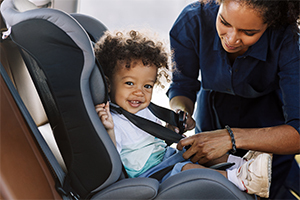
Children are some of the most important cargo you’ll ever carry in your vehicle. When you become a parent, guardian, or caregiver to a child, you must take all the necessary precautions to protect them throughout their ride. Held from September 16-22, Child Passenger Safety Week raises awareness of children’s safety on the road. Here’s what you need to know.
Car crashes are a leading cause of death for children under 13, but that does not mean you can’t help prevent them. One of the best ways is to use the right car seat. Choosing and properly installing the right car seat for your child could significantly reduce the impact of a car accident – and even save their life. This is why it’s crucial to know which car seat to use to support your child’s height, weight, and developmental stage.
This could be the following:
Rear-facing car seats
Per the Academy of Pediatrics (AAP) recommendation, North Carolina laws require all children ages two and under to be seated in a rear-facing car seat in the back seat of a vehicle with a harness and a tether. Rear-facing car seats include:
- Infant car seats are portable, and designed for infants at their smallest and most fragile. It moves with the baby and cradle when handling forces sustained during an accident, minimizing trauma to the baby’s neck and spinal cord.
- Convertible seats, a step up from an infant car seat, are usually outgrown by the child when they turn one year old. Equipped with a harness and a tether, a convertible seat is versatile for the child’s evolving needs.
- All-in-one seats, which can be backward and forward facing, include a harness and a tether. These seats can be converted into booster seats to support the child as they grow continuously.
Forward-facing car seats
Children should be seated in forward-facing car seats until they are about four or five years old or exceed the manufacturer’s height and weight requirements. These car seats typically have the same protections as a rear-facing seat, but with the following subtypes:
- Convertible seats can change from a rear-facing seat to a front-facing seat with a harness and a tether.
- Combination seats change from a forward-facing car seat with a harness and tether to a booster seat.
- All-in-one seats, which can be forward-facing and rear-facing with a harness and tether, can be converted into a booster seats.
Booster seats
These seats are typically used when the child has outgrown their forward-facing car seat. There are two types of booster seats: backless and full support. You should only seat your child in a backless booster seat if your vehicle has a proper headrest. If the seats in your car don’t have a headrest, you must use a full-support booster seat. In addition, you must secure the child with a lap and shoulder belt that fits snugly around the thighs and chest, respectively.
Seatbelts
According to North Carolina law, children either eight years old or at least 80 pounds can be secured with a standard seatbelt. For more information on your child’s safety in your vehicle, you can speak with a nationally certified Child Passenger Safety Technician at a Permanent Checking Station.
Permanent Checking Stations (PCS)
Permanent Checking Stations, or PCS, are locations in North Carolina where parents and caregivers can receive information about child passenger safety. Additionally, they can have their car seats and seat belts checked to ensure they’re installed and used correctly. To learn more about PCS and find your nearest location, click here.
We’re Accident Attorneys Who Protect the Families of the Triad
At Daggett Shuler, we care about the future generations of our community. We observe Child Passenger Safety Awareness Week to ensure that children of the Triad are safe and secure throughout their trip. A car accident could impact your whole family instantly, and we understand the devastating emotional, physical, and financial toll it takes. That’s why our mission is to help hurt and harmed families when they need us most.
If you or a loved one were injured in a car accident through no fault of your own, we’re here to help. Contact us today by submitting the form below or call our office at 336-724-1234 for a free legal consultation.

